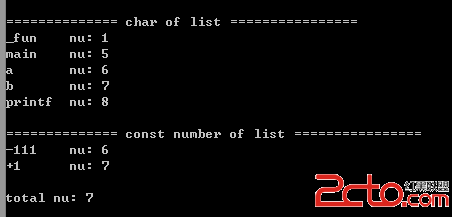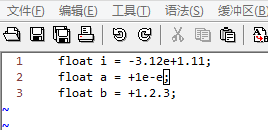詞法分析器:
有限狀態機的理論並不難,但是如果把狀態機理論轉換成代碼,這個就需要思考了
數據結構設計:
[cpp]
char charList[_CHARLIST_SIZE][15] = {0};
char charList_nu[_CHARLIST_SIZE] = {0};
char charList_index = 0;
char numList[_NUMLIST_SIZE][15] = {0};
char numList_nu[_CHARLIST_SIZE] = {0};
char numList_index = 0;
char delimilterList[_DELIMILTER_SIZE][15] = {0};
char delimilterList_nu[_DELIMILTER_SIZE] = {0};
char delimilterList_index = 0;
由於最後輸出需要看到非保留字和數字本身,以及出現的行號,所以這裡用三個變量來記錄,其中*_index 表示的數組的長度。
保留字:
[cpp]
char reserveList[_RESERVE_NUM][15] = {
"void", "int", "char", "float", "double",
"while", "auto", "break", "case", "const",
"continue", "default", "do", "else", "enum",
"extern", "for", "goto", "if", "long",
"return", "short", "signed", "sizeof", "static",
"struct", "switch", "typedef", "union", "unsigned",
"volatile", "redister"
};
Google後所查詢到的保留字,這裡我沒有發現main,由此可見main 應該是預處理的時候給處理掉了。
狀態機:
由於書上的內容不全,因此在編寫的時候在判斷 isLetter 加入了’_’,判斷數字的時候加入了+- 號的判斷,以及雙引號的判斷。
待編譯內容
[cpp]
void _fun() {
}
int main() {
int a = -111;
int b = +1;
printf("%d, a);
return 0;
}
可以看到這個代碼是正確的代碼。
運行後的結果,可以看到字符和常量已經分別出來了,這裡我就不截圖了,太麻煩。
在處理雙引號的時候,當匹配到第一個引號時,即是狀態機的初態,遇到下一個引號即到達終態,但是如果是錯誤代碼(如下圖),即無法到達終態,怎麼辦?
對於這種情況我沒有單獨處理,輸出結果如下:
 我們看到這裡有一個總行數total nu 為7是錯誤的。因為我們在處理引號的初態時,始終無法匹配到第二個引號,自然也就始終把 /n 當成是引號中的內容,在以引號為初態的狀態機中跳轉。
關於回退指針,由於我沒有一次讀取到一個字符數組中,所以用了一個內置函數 ungetc,能將字符放回到流中
由於要以文本輸出,就用freopen,然後fprintf即可,如果用fputc的話只能單個的輸入。
對於數字的處理(下圖為樣例):
我們看到這裡有一個總行數total nu 為7是錯誤的。因為我們在處理引號的初態時,始終無法匹配到第二個引號,自然也就始終把 /n 當成是引號中的內容,在以引號為初態的狀態機中跳轉。
關於回退指針,由於我沒有一次讀取到一個字符數組中,所以用了一個內置函數 ungetc,能將字符放回到流中
由於要以文本輸出,就用freopen,然後fprintf即可,如果用fputc的話只能單個的輸入。
對於數字的處理(下圖為樣例):
 由此可見第一個是正確的輸入,後兩個均為不可識別的部分。下圖為我識別出的部分
由此可見第一個是正確的輸入,後兩個均為不可識別的部分。下圖為我識別出的部分
 原本我想的是這樣的識別肯定是錯誤的,因為它把不應該識別的部分也識別出來了,也就是說這裡存在語法錯誤。但是後來一想,這是對的,因為只要存在不識別的部分,就直接報錯。我們只需要關注需要識別的部分即可。這裡可以很清楚的看到我把-3.12e+1.11識別出來了。
如果要讓line 2和line 3不顯示東西的話,需要考慮的問題就是當終態出現的時候,比如識別+1e-e時,先識別 +1e-,然後當識別e 的時候,這裡出現了錯誤,無法到達終態。然後用ungetc回退,之後再次讀入e,這裡就當成了一個字符,即最後在line 2顯示出了e ,這就是原因。Line3也是。但是如我之前所說,只要出現識別不了的東西,直接報錯即可。我這裡通過返回error,並且這個error是用lastRetval全局變量來標識的,這和windows編程裡的getLastError有著一樣的意思。
由於是現學現寫,不免有部分是錯誤的。還望各位大神指點,而且目前對語法分析,和語義分析還不清楚。
代碼:
[cpp]
#include <stdio.h>
#include <iostream>
#include <cstring>
#define NUMERROR -1
#define _RESERVE_NUM 32
#define _DELIMILTER_NUM 8
#define _DELIMILTER_SIZE 100
#define _CHARLIST_SIZE 100
#define _NUMLIST_SIZE 100
#define _TOKEN_SIZE 100
#define COL 1000
#define LT 1
#define LE 2
#define EQ 3
using namespace std;
FILE* fp;
int lastRetval = 0;
char charList[_CHARLIST_SIZE][15] = {0};
char charList_nu[_CHARLIST_SIZE] = {0};
char charList_index = 0;
char numList[_NUMLIST_SIZE][15] = {0};
char numList_nu[_CHARLIST_SIZE] = {0};
char numList_index = 0;
char delimilterList[_DELIMILTER_SIZE][15] = {0};
char delimilterList_nu[_DELIMILTER_SIZE] = {0};
char delimilterList_index = 0;
char reserveList[_RESERVE_NUM][15] = {
"void", "int", "char", "float", "double",
"while", "auto", "break", "case", "const",
"continue", "default", "do", "else", "enum",
"extern", "for", "goto", "if", "long",
"return", "short", "signed", "sizeof", "static",
"struct", "switch", "typedef", "union", "unsigned",
"volatile", "redister"
};
char delimilter[_DELIMILTER_NUM][5] = {
"+", "-", "*", "/", "<", ";", "<=", "==" // six plus two
};
void nu_print(int nu) {
int i, cindex, nindex, flag, hasPrint;
cindex = nindex = 0;
printf("\n======================== each line to see =========================\n");
for(i = 0; i < nu; i++) {
hasPrint = 0;
for( ; cindex <= charList_index || nindex <= numList_index; ) {
flag = 0;
if(charList_nu[cindex] == i+1) {
if(0 == hasPrint) {
printf("\nline %d\n", i+1);
hasPrint = 1;
}
printf(" %s ", charList[cindex]);
++cindex;
flag = 1;
}
if(numList_nu[nindex] == i+1) {
if(0 == hasPrint) {
printf("\nline %d\n", i+1);
hasPrint = 1;
}
printf(" %s ", numList[nindex]);
++nindex;
flag = 1;
}
if(0 == flag) break;
}
}
}
void _print(int nu) {
int i, j;
printf("\n============== char of list ================\n");
for(i = 0; i < charList_index; i++) {
printf("%s nu: %d\n", charList[i], charList_nu[i]);
fprintf(fp,"%s nu: %d\n", charList[i], charList_nu[i]);
}
printf("\n============== const number of list ================\n");
for(i = 0; i < numList_index; i++) {
printf("%s nu: %d\n", numList[i], numList_nu[i]);
fprintf(fp, "%s nu:%d\n", numList[i], numList_nu[i]);
}
printf("\ntotal nu: %d\n", nu);
}
bool isLetter(char a){
if((a <= 'Z' && a >= 'A') || (a <= 'z' && a >= 'a') || '_' == a) {
return true;
}
else return false;
}
bool isDigit(char a) {
if(a <= '9' && a >= '1') {
return true;
}
else return false;
}
void concatenation(char token[_TOKEN_SIZE], char str) {
int len = strlen(token);
token[len] = str;
}
int reserve(char token[_TOKEN_SIZE]) {
int i, j;
for(i = 0; i < _RESERVE_NUM; i++) {
if(!strcmp(&reserveList[i][0], token)) {
return 1;
}
}
for(i = 0; i < _DELIMILTER_NUM; i++) {
if(!strcmp(&delimilter[i][0], token)) {
return 2;
}
}
return 0;
}
int buildCharList(char token[_TOKEN_SIZE]) {
strcpy(&charList[charList_index][0], token);
++charList_index;
return charList_index-1;
}
int buildNumList(char token[_TOKEN_SIZE]) {
strcpy(&numList[numList_index][0], token);
++numList_index;
return numList_index-1;
}
int analysisCode(char str, int& nu) {
int num;
char token[_TOKEN_SIZE];
memset(token, 0, sizeof(token));
if('\n' == str) {
++nu;
return '\n';
}
else if(isLetter(str)) {
while(isLetter(str) || isDigit(str)) {
concatenation(token, str);
str = getchar();
}
ungetc(str, stdin);
int type = reserve(token);
if(0 == type) {
num = buildCharList(token);
charList_nu[num] = nu;
}
memset(token, 0, sizeof(token));
return num;
}
else if(isDigit(str) || '+' == str || '-' == str) {
if(NUMERROR == lastRetval) {
return NUMERROR;
}
int dotFlag, eFlag, numFlag, fFlag;
int eNum, dotNum, fNum;
dotFlag = eFlag = 0;
numFlag = fFlag = 1;
eNum = dotNum = fNum = 0;
while(isDigit(str) || 'e' == str || '.' == str || '+' == str || '-' == str) {
if('e' == str) {
if(0 == eFlag || 1 == eNum) {
ungetc(str, stdin);
return NUMERROR;
}
dotFlag = 0;
eFlag = 0;
numFlag = 1;
fFlag = 1;
++eNum;
dotNum = 0;
fNum = 0;
}
else if('+' == str || '-' == str) {
if(0 == fFlag || 1 == fNum) {
ungetc(str, stdin);
return NUMERROR;
}
dotFlag = 0;
eFlag = 0;
numFlag = 1;
fFlag = 0;
++fNum;
}
else if('.' == str) {
if(0 == dotFlag || 1 == dotNum) {
ungetc(str, stdin);
return NUMERROR;
}
dotFlag = 0;
eFlag = 0;
numFlag = 1;
fFlag = 0;
++dotNum;
}
else if(isDigit(str)) {
dotFlag = 1;
eFlag = 1;
numFlag = 1;
fFlag = 0;
}
concatenation(token, str);
str = getchar();
}
ungetc(str, stdin);
num = buildNumList(token);
numList_nu[num] = nu;
memset(token, 0, sizeof(token));
return num;
}
else if('"' == str) {
int flag = 0;
while(0 == flag) {
concatenation(token, str);
str = getchar();
if('"' == str) {
flag = 1;
}
}
concatenation(token, str);
}
else {
for(int i = 0; i < 6; i++) {
if(delimilter[i][0] == str) {
return str;
}
}
if('<' == str) {
str = getchar();
if('=' == str) {
return LE;
}
ungetc(str, stdin);
return LT;
}
if('=' == str) {
str = getchar();
if('=' == str) {
return EQ;
}
ungetc(str, stdin);
return '=';
}
}
// return NUMERROR;
}
int main() {
freopen("t1.txt", "rw", stdin);
fp = fopen("D://file.txt", "w");
char str;
char token[_TOKEN_SIZE];
int nu = 1;
memset(token, 0, sizeof(token));
while(scanf("%c", &str) != EOF) {
lastRetval = analysisCode(str, nu);
}
_print(nu-1);
nu_print(nu-1);
fclose(stdin);
return 0;
}
原本我想的是這樣的識別肯定是錯誤的,因為它把不應該識別的部分也識別出來了,也就是說這裡存在語法錯誤。但是後來一想,這是對的,因為只要存在不識別的部分,就直接報錯。我們只需要關注需要識別的部分即可。這裡可以很清楚的看到我把-3.12e+1.11識別出來了。
如果要讓line 2和line 3不顯示東西的話,需要考慮的問題就是當終態出現的時候,比如識別+1e-e時,先識別 +1e-,然後當識別e 的時候,這裡出現了錯誤,無法到達終態。然後用ungetc回退,之後再次讀入e,這裡就當成了一個字符,即最後在line 2顯示出了e ,這就是原因。Line3也是。但是如我之前所說,只要出現識別不了的東西,直接報錯即可。我這裡通過返回error,並且這個error是用lastRetval全局變量來標識的,這和windows編程裡的getLastError有著一樣的意思。
由於是現學現寫,不免有部分是錯誤的。還望各位大神指點,而且目前對語法分析,和語義分析還不清楚。
代碼:
[cpp]
#include <stdio.h>
#include <iostream>
#include <cstring>
#define NUMERROR -1
#define _RESERVE_NUM 32
#define _DELIMILTER_NUM 8
#define _DELIMILTER_SIZE 100
#define _CHARLIST_SIZE 100
#define _NUMLIST_SIZE 100
#define _TOKEN_SIZE 100
#define COL 1000
#define LT 1
#define LE 2
#define EQ 3
using namespace std;
FILE* fp;
int lastRetval = 0;
char charList[_CHARLIST_SIZE][15] = {0};
char charList_nu[_CHARLIST_SIZE] = {0};
char charList_index = 0;
char numList[_NUMLIST_SIZE][15] = {0};
char numList_nu[_CHARLIST_SIZE] = {0};
char numList_index = 0;
char delimilterList[_DELIMILTER_SIZE][15] = {0};
char delimilterList_nu[_DELIMILTER_SIZE] = {0};
char delimilterList_index = 0;
char reserveList[_RESERVE_NUM][15] = {
"void", "int", "char", "float", "double",
"while", "auto", "break", "case", "const",
"continue", "default", "do", "else", "enum",
"extern", "for", "goto", "if", "long",
"return", "short", "signed", "sizeof", "static",
"struct", "switch", "typedef", "union", "unsigned",
"volatile", "redister"
};
char delimilter[_DELIMILTER_NUM][5] = {
"+", "-", "*", "/", "<", ";", "<=", "==" // six plus two
};
void nu_print(int nu) {
int i, cindex, nindex, flag, hasPrint;
cindex = nindex = 0;
printf("\n======================== each line to see =========================\n");
for(i = 0; i < nu; i++) {
hasPrint = 0;
for( ; cindex <= charList_index || nindex <= numList_index; ) {
flag = 0;
if(charList_nu[cindex] == i+1) {
if(0 == hasPrint) {
printf("\nline %d\n", i+1);
hasPrint = 1;
}
printf(" %s ", charList[cindex]);
++cindex;
flag = 1;
}
if(numList_nu[nindex] == i+1) {
if(0 == hasPrint) {
printf("\nline %d\n", i+1);
hasPrint = 1;
}
printf(" %s ", numList[nindex]);
++nindex;
flag = 1;
}
if(0 == flag) break;
}
}
}
void _print(int nu) {
int i, j;
printf("\n============== char of list ================\n");
for(i = 0; i < charList_index; i++) {
printf("%s nu: %d\n", charList[i], charList_nu[i]);
fprintf(fp,"%s nu: %d\n", charList[i], charList_nu[i]);
}
printf("\n============== const number of list ================\n");
for(i = 0; i < numList_index; i++) {
printf("%s nu: %d\n", numList[i], numList_nu[i]);
fprintf(fp, "%s nu:%d\n", numList[i], numList_nu[i]);
}
printf("\ntotal nu: %d\n", nu);
}
bool isLetter(char a){
if((a <= 'Z' && a >= 'A') || (a <= 'z' && a >= 'a') || '_' == a) {
return true;
}
else return false;
}
bool isDigit(char a) {
if(a <= '9' && a >= '1') {
return true;
}
else return false;
}
void concatenation(char token[_TOKEN_SIZE], char str) {
int len = strlen(token);
token[len] = str;
}
int reserve(char token[_TOKEN_SIZE]) {
int i, j;
for(i = 0; i < _RESERVE_NUM; i++) {
if(!strcmp(&reserveList[i][0], token)) {
return 1;
}
}
for(i = 0; i < _DELIMILTER_NUM; i++) {
if(!strcmp(&delimilter[i][0], token)) {
return 2;
}
}
return 0;
}
int buildCharList(char token[_TOKEN_SIZE]) {
strcpy(&charList[charList_index][0], token);
++charList_index;
return charList_index-1;
}
int buildNumList(char token[_TOKEN_SIZE]) {
strcpy(&numList[numList_index][0], token);
++numList_index;
return numList_index-1;
}
int analysisCode(char str, int& nu) {
int num;
char token[_TOKEN_SIZE];
memset(token, 0, sizeof(token));
if('\n' == str) {
++nu;
return '\n';
}
else if(isLetter(str)) {
while(isLetter(str) || isDigit(str)) {
concatenation(token, str);
str = getchar();
}
ungetc(str, stdin);
int type = reserve(token);
if(0 == type) {
num = buildCharList(token);
charList_nu[num] = nu;
}
memset(token, 0, sizeof(token));
return num;
}
else if(isDigit(str) || '+' == str || '-' == str) {
if(NUMERROR == lastRetval) {
return NUMERROR;
}
int dotFlag, eFlag, numFlag, fFlag;
int eNum, dotNum, fNum;
dotFlag = eFlag = 0;
numFlag = fFlag = 1;
eNum = dotNum = fNum = 0;
while(isDigit(str) || 'e' == str || '.' == str || '+' == str || '-' == str) {
if('e' == str) {
if(0 == eFlag || 1 == eNum) {
ungetc(str, stdin);
return NUMERROR;
}
dotFlag = 0;
eFlag = 0;
numFlag = 1;
fFlag = 1;
++eNum;
dotNum = 0;
fNum = 0;
}
else if('+' == str || '-' == str) {
if(0 == fFlag || 1 == fNum) {
ungetc(str, stdin);
return NUMERROR;
}
dotFlag = 0;
eFlag = 0;
numFlag = 1;
fFlag = 0;
++fNum;
}
else if('.' == str) {
if(0 == dotFlag || 1 == dotNum) {
ungetc(str, stdin);
return NUMERROR;
}
dotFlag = 0;
eFlag = 0;
numFlag = 1;
fFlag = 0;
++dotNum;
}
else if(isDigit(str)) {
dotFlag = 1;
eFlag = 1;
numFlag = 1;
fFlag = 0;
}
concatenation(token, str);
str = getchar();
}
ungetc(str, stdin);
num = buildNumList(token);
numList_nu[num] = nu;
memset(token, 0, sizeof(token));
return num;
}
else if('"' == str) {
int flag = 0;
while(0 == flag) {
concatenation(token, str);
str = getchar();
if('"' == str) {
flag = 1;
}
}
concatenation(token, str);
}
else {
for(int i = 0; i < 6; i++) {
if(delimilter[i][0] == str) {
return str;
}
}
if('<' == str) {
str = getchar();
if('=' == str) {
return LE;
}
ungetc(str, stdin);
return LT;
}
if('=' == str) {
str = getchar();
if('=' == str) {
return EQ;
}
ungetc(str, stdin);
return '=';
}
}
// return NUMERROR;
}
int main() {
freopen("t1.txt", "rw", stdin);
fp = fopen("D://file.txt", "w");
char str;
char token[_TOKEN_SIZE];
int nu = 1;
memset(token, 0, sizeof(token));
while(scanf("%c", &str) != EOF) {
lastRetval = analysisCode(str, nu);
}
_print(nu-1);
nu_print(nu-1);
fclose(stdin);
return 0;
}